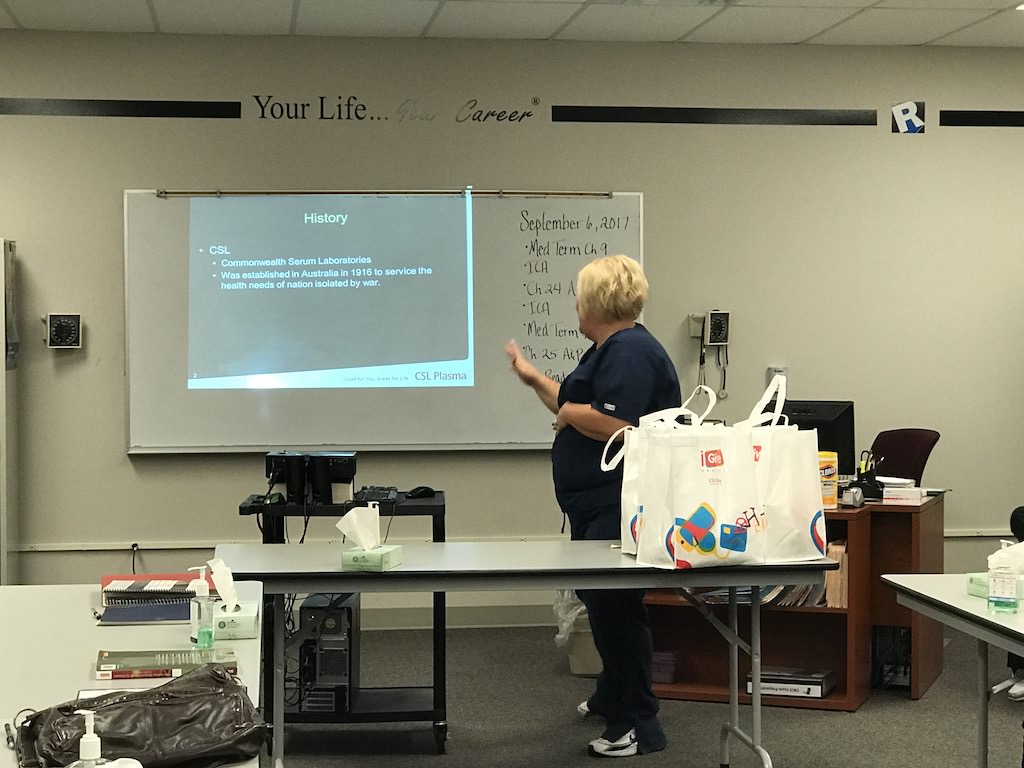 Recently, Desiree Wright, a Licensed Practical Nurse from CSL Plasma Center visited the Ross Medical Education Center Port Huron, Michigan campus. In addition to being a local medical professional with experience in the healthcare field to share with students, she also proved herself to be an engaging speaker. “Desiree captivated our students with information regarding CSL’s history and what the site can do for the people in our local community and beyond,” shared Stacey Clark, Assistant Campus Director of Education.
Recently, Desiree Wright, a Licensed Practical Nurse from CSL Plasma Center visited the Ross Medical Education Center Port Huron, Michigan campus. In addition to being a local medical professional with experience in the healthcare field to share with students, she also proved herself to be an engaging speaker. “Desiree captivated our students with information regarding CSL’s history and what the site can do for the people in our local community and beyond,” shared Stacey Clark, Assistant Campus Director of Education.
As the Medical Operations Supervisor, Desiree spoke with the students at length regarding the Commonwealth Serum Laboratory and their areas of expertise. The question often asked is “what is plasma?” Desiree explained that plasma is a straw-colored liquid in blood once it is spun and separated. Plasma carries the red blood cells, white blood cells, and platelets. Plasma is made up of: water (about 90%), proteins and clotting factors (8%), and small amounts of salts, glucose, and lipids. She explained that plasma is a potent weapon against various diseases and often a life-saving solution to a variety of health conditions. Plasma can be used to create immunoglobulins, coagulants, critical care products, wound healing and respiratory treatments. Desiree proudly stated that human plasma can be used to produce a wide range of life-saving medicines. CSL Plasma laboratory supports all aspects of the process from the collection and testing of donated plasma to the production of a range of plasma-derived products.
Great care is taken by the staff of the laboratory to ensure the integrity of the plasma and the professional reputation of the donor centers. Detailed demographic information from each donor is needed to ensure integrity is maintained. The plasma is traced every step of the way utilizing state-of-the-art facilities which are responsible for receiving, storing, and shipping plasma from the collection centers. The facility utilizes a “vein to vial” control, tracing each plasma unit from the initial donation. The lab tests millions of plasma samples each year, to ensure the safety of the plasma. Both serological and Nucleic Acid Testing (NAT) is conducted to identify viruses. NAT testing allows certain viruses to be detected even before a donor displays any symptoms or develops antibodies. This very sensitive screening can detect viruses earlier than serological testing.
The center itself is made up of a reception area along with an MSA office, donor floor, and on-site laboratory. The center performs a variety of medical health processes that could potentially be conducted by employed Ross graduates. The center is customer focused with innovation as a top priority along with integrity, collaboration, and superior performance.
